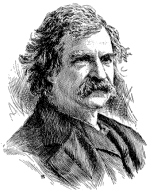The Boys’ Life of Mark Twain
by Paine

LXV. The Removal to Redding
There followed another winter during which I was much with Mark Twain, though a part of it he spent with Mr. Rogers in Bermuda, that pretty island resort which both men loved. Then came spring again, and June, and with it Mark Twain’s removal to his newly built home, “Stormfield," at Redding, Connecticut.
The house had been under construction for a year. He had never seen it– never even seen the land I had bought for him. He even preferred not to look at any plans or ideas for decoration.
“When the house is finished and furnished, and the cat is purring on the hearth, it will be time enough for me to see it,” he had said more than once.
He had only specified that the rooms should be large and that the billiard-room should be red. His billiard-rooms thus far had been of that color, and their memory was associated in his mind with enjoyment and comfort. He detested details of preparation, and then, too, he looked forward to the dramatic surprise of walking into a home that had been conjured into existence as with a word.
It was the 18th of June, 1908, that he finally took possession. The Fifth Avenue house was not dismantled, for it was the plan then to use Stormfield only as a summer place. The servants, however, with one exception, had been transferred to Redding, and Mark Twain and I remained alone, though not lonely, in the city house; playing billiards most of the time, and being as hilarious as we pleased, for there was nobody to disturb. I think he hardly mentioned the new home during that time. He had never seen even a photograph of the place, and I confess I had moments of anxiety, for I had selected the site and had been more or less concerned otherwise, though John Howells was wholly responsible for the building. I did not really worry, for I knew how beautiful and peaceful it all was.
The morning of the 18th was bright and sunny and cool. Mark Twain was up and shaved by six o’clock in order to be in time. The train did not leave until four in the afternoon, but our last billiards in town must begin early and suffer no interruption. We were still playing when, about three, word was brought up that the cab was waiting. Arrived at the station, a group collected, reporters and others, to speed him to his new home. Some of the reporters came along.
The scenery was at its best that day, and he spoke of it approvingly. The hour and a half required to cover the sixty miles’ distance seemed short. The train porters came to carry out the bags. He drew from his pocket a great handful of silver.
“Give them something,” he said; “give everybody liberally that does any service.”
There was a sort of open-air reception in waiting–a varied assemblage of vehicles festooned with flowers had gathered to offer gallant country welcome. It was a perfect June evening, still and dream-like; there seemed a spell of silence on everything. The people did not cheer–they smiled and waved to the white figure, and he smiled and waved reply, but there was no noise. It was like a scene in a cinema.
His carriage led the way on the three-mile drive to the house on the hilltop, and the floral procession fell in behind. Hillsides were green, fields were white with daisies, dogwood and laurel shone among the trees. He was very quiet as we drove along. Once, with gentle humor, looking out over a white daisy-field, he said:
“That is buckwheat. I always recognize buckwheat when I see it. I
wish I knew as much about other things as I know about buckwheat.”
The clear-running brooks, a swift-flowing river, a tumbling cascade where we climbed a hill, all came in for his approval–then we were at the lane that led to his new home, and the procession behind dropped away. The carriage ascended still higher, and a view opened across the Saugatuck Valley, with its nestling village and church-spire and farmhouses, and beyond them the distant hills. Then came the house–simple in design, but beautiful–an Italian villa, such as he had known in Florence, adapted here to American climate and needs.
At the entrance his domestic staff waited to greet him, and presently he stepped across the threshold and stood in his own home for the first time in seventeen years. Nothing was lacking–it was as finished, as completely furnished, as if he had occupied it a lifetime. No one spoke immediately, but when his eyes had taken in the harmony of the place, with its restful, home-like comfort, and followed through the open French windows to the distant vista of treetops and farmsides and blue hills, he said, very gently:
“How beautiful it all is! I did not think it could be as beautiful
as this.” And later, when he had seen all of the apartments: “It is
a perfect house–perfect, so far as I can see, in every detail. It
might have been here always.”
There were guests that first evening–a small home dinner-party–and a little later at the foot of the garden some fireworks were set off by neighbors inspired by Dan Beard, who had recently located in Redding. Mark Twain, watching the rockets that announced his arrival, said, gently:
“I wonder why they go to so much trouble for me. I never go to any
trouble for anybody.”
The evening closed with billiards, hilarious games, and when at midnight the cues were set in the rack no one could say that Mark Twain’s first day in his new home had not been a happy one.
 Continue...
Continue...![[Buy at Amazon]](http://images.amazon.com/images/P/B0006AHKG6.01.MZZZZZZZ.jpg)